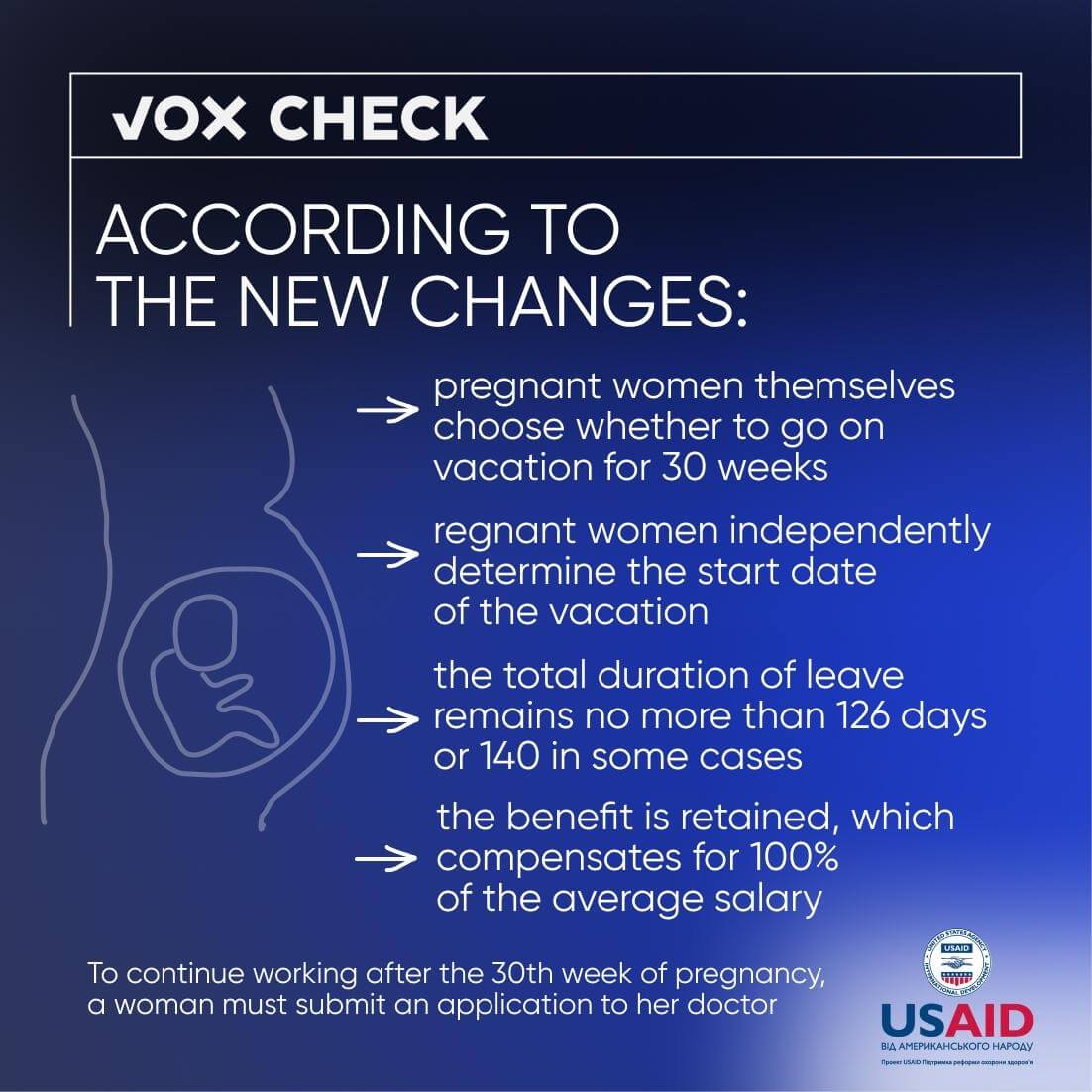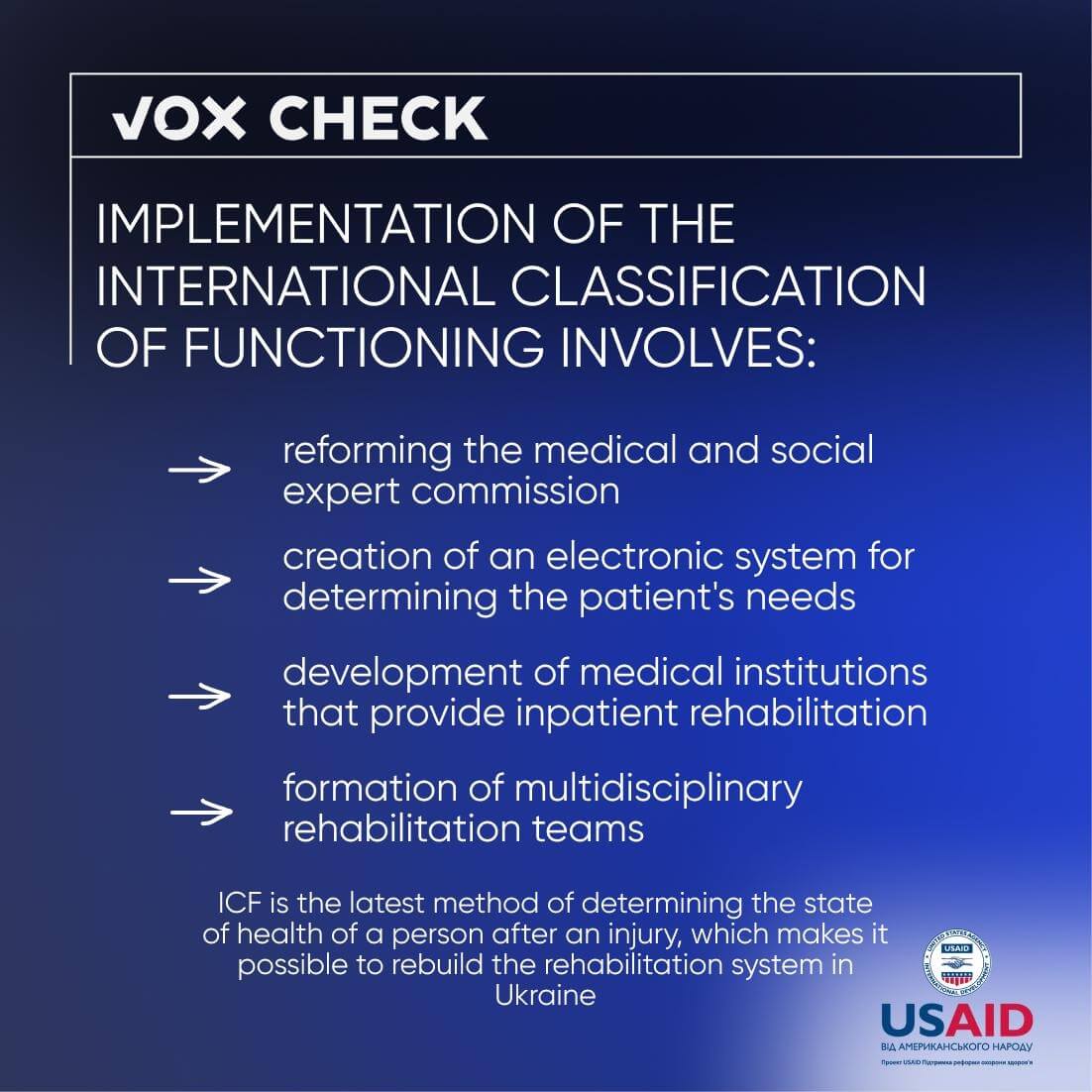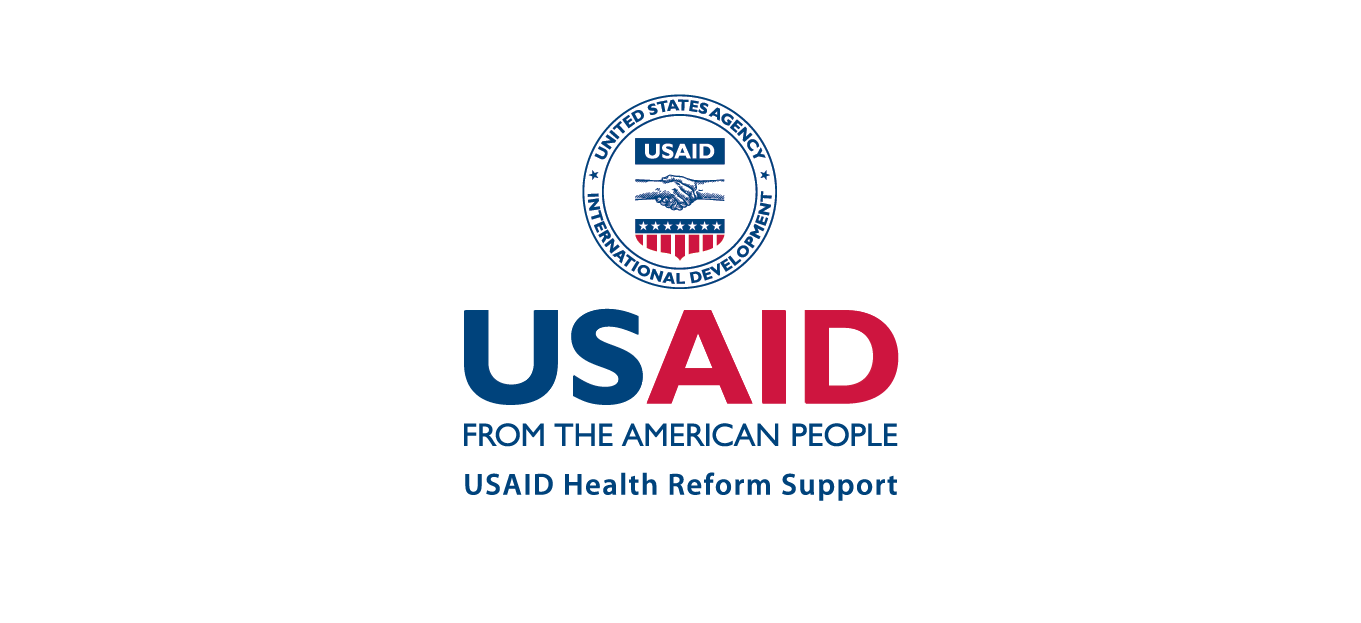This time we refuted fakes about changes in Ukrainian legislation in the field of health care. In the first case, the Russian media spread information that the order of the Ministry of Health of Ukraine would allow employers to force a pregnant woman to work until the last day before giving birth. In the second case, the propagandists said that, at the request of the IMF, the Ukrainian authorities allegedly plan to cut funding for social assistance to people with disabilities in half. For this, the concept of “disability” will be replaced by the term “assessment of loss of functionality,” and people with disabilities will be sent to work in order to save on social benefits.
With the support of the USAID Health Reform Support project, VoxCheck analyzes and refutes public health narratives spread in the information space of Ukraine, Belarus, and russia on a weekly basis.
Disinformation: Employers can force pregnant women to work until the last day before giving birth
As soon as the government approved new changes regarding maternity leave, Russian Telegram channels began manipulating and spreading disinformation. The messages claim that pregnant women will now decide when to take maternity leave on their own. Supposedly, this means that employers can compel pregnant women to work until the last day before childbirth.
Screenshot of the post
What’s the reality?
On October 18, 2023, the Ministry of Health of Ukraine issued an order regarding changes to the “Procedure for the Formation of Medical Opinions on Temporary Disability in the Register of Medical Opinions in the Electronic Health System.” Deputy Minister of Health of Ukraine Mariia Karchevych also discussed these changes in a telethon on November 11, 2023.
Now, a woman will be able to choose whether to take maternity leave at 30 weeks of pregnancy and determine the start date herself. To do this, the woman needs to submit an application to the doctor overseeing her pregnancy, stating that she intends to continue working after 30 weeks of pregnancy. In the application, the woman specifies the date on which the medical opinion on temporary disability is to be issued by the doctor.
Previously, women who were at 30 weeks of pregnancy and under medical supervision received a medical certificate from their doctor indicating temporary disability under the category of “pregnancy and childbirth.” After obtaining such a medical certificate, a woman was obliged to go on maternity leave.
Pregnant women could choose to continue working, but in that case, the number of maternity leave days related to pregnancy and childbirth was reduced by the number of days she worked. The amount of financial assistance in such cases also decreased, as it depended on the number of days of maternity leave.
At the same time, Russian Telegram channels manipulate and claim that the employer will force a woman to work until the last day before childbirth. In reality, the old rules remain, and a woman can voluntarily take maternity leave from 30 weeks of pregnancy. The new changes will not affect the overall duration of maternity leave. Financial assistance will also remain at a level that compensates 100% of the average salary for the entire maternity leave period.
Source: Ministry of Health of Ukraine
In this way, Russians are merely attempting to discredit the healthcare system and portray that all changes supposedly happen not in favor of Ukrainians but to their detriment.
In July 2023, the Verkhovna Rada also passed bill No. 9271 regarding the specifics of using maternity leave. By choice or in case of medical contraindications, a portion of the leave, specifically 70 days allocated before childbirth, can be postponed and used after childbirth. The total duration of the leave is not more than 126 calendar days and 140 days in the case of the birth of two or more children or complicated childbirth.
Disinformation: The IMF demands that Ukraine reduce aid to people with disabilities
Information is circulating online claiming that the International Monetary Fund (IMF) is demanding that the Ukrainian government cut funding for people with disabilities by half. In response to this, the Ukrainian authorities are reportedly planning to replace the term “disability” with the term “functional impairment assessment.” The post suggests that these changes are being proposed to integrate people with disabilities into the workforce without providing them with social assistance and to collect taxes from their work.
The message also adds that the IMF is demanding the cancellation of disability status in 2024, not in 202, as announced by the Ukrainian Minister of Health, Viktor Liashko.
What’s the reality?
The IMF did not make any demands regarding the reduction of funding for social payments to people with disabilities, nor did it require a change in the concept of “disability.” The IMF program for Ukraine does not include any requirements related to healthcare at all.
Additionally, in the Ukrainian state budget for 2024, the subsistence minimum for people who have lost their ability to work will be 2,361 UAH per month. This is 268 UAH more than in 2023. Considering the projected inflation of 9.7%, the real increase will be 52 UAH or 2.8%. In 2023, pensions were indexed for 94,500 people with disabilities. Furthermore, funding for the Fund for Social Protection of Persons with Disabilities has increased, from which individuals with disabilities can receive prosthetics, special self-care tools, necessary furniture and equipment, orientation aids, and information exchange tools free of charge.
The transition to the International Classification of Functioning will involve providing comprehensive rehabilitation to patients not only in the health sector but also in related areas of well-being, including education and work. According to the plan, the state will assist individuals with limited levels of functioning who wish to work in finding employment. The state will compensate for some expenses for those whose health condition prevents them from working.
In April 2022, the Ministry of Health of Ukraine approved the International Classification of Functioning, Disability, and Health (ICF) as a national classifier. The Minister of Health, Viktor Liashko, announced that an electronic module for assessing the level of functioning, limitations in daily activities, and health of individuals would be developed for the implementation of the ICF.
Unlike the previous system, the current classifier will focus not on diseases but on the consequences of health issues. This standardized system will introduce the definition of health components and health-related components of well-being, including education and work. The goal of the International Classification of Functioning is not only to treat the patient or provide social assistance but also to offer support in returning to work and education.
The Cabinet of Ministers believes that three disability categories are insufficient for determining a person’s loss of functionality. Therefore, disability groups may be abolished, but currently, there is no information about the indicators that will be introduced in their place. Alexander Vozniuk, the head of the Advocacy Association for People with Disabilities, stated that the degree of functional limitation will likely be determined as a percentage.
In May 2023, the Government approved a plan to reform the Medical-Social Expert Commission (MSEC, which determines disability groups) and to change the assessment and provision of needs for people with disabilities. The document outlined steps and deadlines for transitioning to the International Classification of Functioning by 2025. As of the writing of this article, the Cabinet of Ministers had not made any adjustments to the deadlines.
In October, the Ministry of Health of Ukraine prepared a draft law that changes the methodology for determining disability, but as of November 14, the document has not yet been submitted to the Verkhovna Rada. As explained by Viktor Liashko, the reform will be comprehensive and involve changes in the MSEC’s operations, the introduction of digitalization, and the development of the capacity of medical facilities providing inpatient rehabilitation.
According to the previous vision, after sustaining an injury, patients will seek assistance from medical institutions, where multidisciplinary rehabilitation teams will be formed. These teams will develop an individual rehabilitation plan that includes support for the person’s return to society. “Currently, our problem is that we are fixated on disability because it provides benefits and compensation, rather than focusing on returning the individual to an economic state. We don’t ask what the person wants; instead, we say, ‘Here’s what we can give.’ This is a post-Soviet model that we need to reject,” stated the minister.
The Minister of Social Policy of Ukraine, Oksana Zholnovych, also emphasized that the state will provide prosthetics for people with amputations, retrain them, assist in arranging workplaces, taking into account their specific needs. If individuals wish to work, the state will help them find employment. Consequently, individuals will be able to receive a decent salary higher than social benefits.
“I consider it better to provide services and ensure economic independence for individuals. This is much more effective,” stated Zholnovych. The opportunity for people with disabilities to exercise their right to work is also supported by organizations monitoring the rights of people with disabilities in Ukraine. Meanwhile, for those individuals who are unable to work, the Ministry of Social Policy will compensate for some expenses (social packages, diapers, etc.) and assign a social worker to provide assistance in daily life.
This information piece was produced with the assistance of the United States Agency for International Development (USAID), provided on behalf of the people of the United States of America. This article’s content, which does not necessarily reflect the views of USAID, the United States Government, is the sole responsibility of Deloitte Consulting under contract #72012118C00001.
Attention
The authors do not work for, consult to, own shares in or receive funding from any company or organization that would benefit from this article, and have no relevant affiliations







